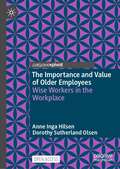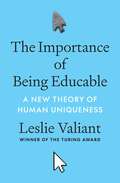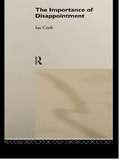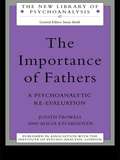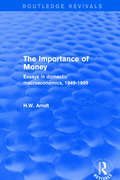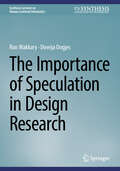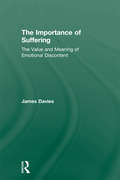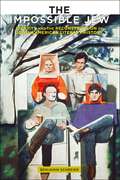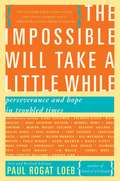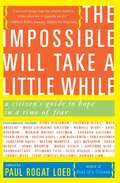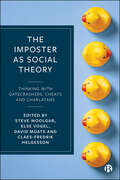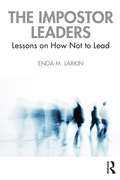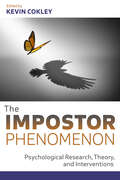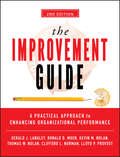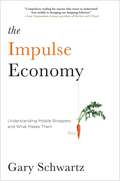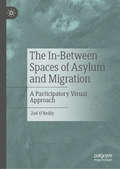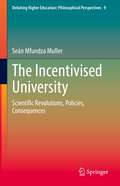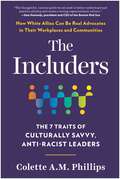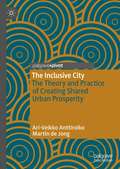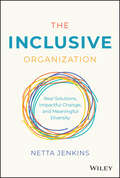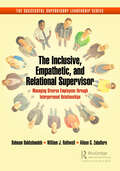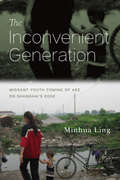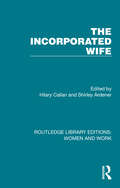- Table View
- List View
The Importance and Value of Older Employees: Wise Workers in the Workplace
by Anne Inga Hilsen Dorothy Sutherland OlsenThis open access book makes a contribution to our understanding of one of the social challenges facing many western nations i.e. the challenge of an ageing population. It specifically addresses the issue of competence among older employees. Others have studied ageing populations in terms of the economic burden or the pressure on healthcare services and generally view the rising numbers of seniors more as a challenge than an opportunity. In this book, authors discuss ways of gaining positive benefits from our ageing and more experienced work force.
The Importance of Being Educable: A New Theory of Human Uniqueness
by Leslie ValiantIn the age of AI, why our future depends on better understanding what makes us humanWe are at a crossroads in history. If we hope to share our planet successfully with one another and the AI systems we are creating, we must reflect on who we are, how we got here, and where we are heading. The Importance of Being Educable puts forward a provocative new exploration of the extraordinary facility of humans to absorb and apply knowledge. The remarkable &“educability&” of the human brain can be understood as an information processing ability. It sets our species apart, enables the civilization we have, and gives us the power and potential to set our planet on a steady course. Yet it comes hand in hand with an insidious weakness. While we can readily absorb entire systems of thought about worlds of experience beyond our own, we struggle to judge correctly what information we should trust.In this visionary book, Leslie Valiant argues that understanding the nature of our own educability is crucial to safeguarding our future. After breaking down how we process information to learn and apply knowledge, and drawing comparisons with other animals and AI systems, he explains why education should be humankind&’s central preoccupation.Will the unique capability that has been so foundational to our achievements and civilization continue to drive our progress, or will we fall victim to our vulnerabilities? If we want to play to our species&’ great strength and protect our collective future, we must better understand and prioritize the vital importance of being educable. This book provides a road map.
The Importance of Disappointment
by Ian CraibThis sane and insightful discussion explores the nature of identity in late modern societies to criticize the way in which psychotherapy has become an ideology of late modernity and to emphasize the importance of `negative' messages in psychoanalytic theory.
The Importance of Fathers: A Psychoanalytic Re-evaluation (The New Library of Psychoanalysis #Vol. 42)
by Judith Trowell Alicia EtchegoyenIt is widely acknowledged that children need structure, security, stability and attachment to develop and flourish, and that the father is an important part of this. Issues such as high divorce rates, new family structures, increased mobility, women's liberation and contraception are very common in society. This book sets out to explore what has happened to men and to fathers during all these changes and transitions. Judith Trowell and Alicia Etchegoyen, along with an array of renowned contributors, consider the importance of fathers in various situations, including: the role of the father at different stage of children's development the missing father loss of a father grandfathers. It is argued that the father is important, not only to support the main carer (usually the mother) but also to provide a caring, thinking, comfortable, confident presence.
The Importance of Money: Essays in Domestic Macroeconomics, 1949-1999 (Routledge Revivals)
by H.W. ArndtThis title was first published in 2001. A collection of essays written by H.W. Arndt, over a 50 year period, that cover a broad range of his work, from analytical issues in monetary and fiscal theory to political economy. The earlier essays should appeal to those interested in the history of economic thought whilst the more recent essays deal with issues such as economic globalization.
The Importance of Speculation in Design Research (Synthesis Lectures on Human-Centered Informatics)
by Ron Wakkary Doenja OogjesThis book explores speculation in design research in the field of human-computer interaction (HCI). The authors reveal how speculative reasoning in design research increases the capacity of HCI to address a wider array of social and research challenges. Speculation in design research employs (1) leaps of imagination, (2) diverse ways of knowing or epistemologies, (3) ethical reflexivity, (4) and makes alternate possibilities experiential. This book shows how each can be productively and critically applied together through existing, emerging, and new research approaches in HCI. The aim of this book is to generously see speculation as more than a form of critique or genre of design research, to instead be seen as broadly central to the material investigations that govern much of the field. In doing so, the book aims to expand the potential role of speculation in HCI and shows how speculation is applicable to a wide range of research goals, which, in turn, creates research approaches in new directions. In expanding the approach and methodology of speculation in HCI, the books draw inspiration from other disciplines and intersectional perspectives. By examining current, emerging, and possible new forms of speculation methods, this book will be of interest to undergraduate and graduate students in HCI as well as seasoned researchers and practitioners.
The Importance of Suffering: The Value and Meaning of Emotional Discontent
by James DaviesIn this book James Davies considers emotional suffering as part and parcel of what it means to live and develop as a human being, rather than as a mental health problem requiring only psychiatric, antidepressant or cognitive treatment. This book therefore offers a new perspective on emotional discontent and discusses how we can engage with it clinically, personally and socially to uncover its productive value. The Importance of Suffering explores a relational theory of understanding emotional suffering suggesting that suffering, does not spring from one dimension of our lives, but is often the outcome of how we relate to the world internally – in terms of our personal biology, habits and values, and externally – in terms of our society, culture and the world around us. Davies suggests that suffering is a healthy call-to-change and shouldn't be chemically anesthetised or avoided. The book challenges conventional thinking by arguing that if we understand and manage suffering more holistically, it can facilitate individual and social transformation in powerful and surprising ways. The Importance of Suffering offers new ways to think about, and therefore understand suffering. It will appeal to anyone who works with suffering in a professional context including professionals, trainees and academics in the fields of counselling, psychotherapy, psychoanalysis, psychiatry and clinical psychology.
The Impossible Jew: Identity and the Reconstruction of Jewish American Literary History
by Benjamin SchreierHe destroys in order to create. In a sweeping critique of the field, Benjamin Schreier resituates Jewish Studies in order to make room for a critical study of identity and identification. Displacing the assumption that Jewish Studies is necessarily the study of Jews, this book aims to break down the walls of the academic ghetto in which the study of Jewish American literature often seems to be contained: alienated from fields like comparative ethnicity studies, American studies, and multicultural studies; suffering from the unwillingness of Jewish Studies to accept critical literary studies as a legitimate part of its project; and so often refusing itself to engage in self-critique. The Impossible Jew interrogates how the concept of identity is critically put to work by identity-based literary study. Through readings of key authors from across the canon of Jewish American literature and culture—including Abraham Cahan, the New York Intellectuals, Philip Roth, and Jonathan Safran Foer—Benjamin Schreier shows how texts resist the historicist expectation that self-evident Jewish populations are represented in and recoverable from them. Through ornate, scabrous, funny polemics, Schreier draws the lines of relation between Jewish American literary study and American studies, multiethnic studies, critical theory, and Jewish Studies formations. He maintains that a Jewish Studies beyond ethnicity is essential for a viable future of Jewish literary study.
The Impossible Will Take A Little While: Perseverance And Hope In Troubled Times
by Paul LoebWhat keeps us going when times get tough? How have the leaders and unsung heroes of world-changing political movements persevered in the face of cynicism, fear, and seemingly overwhelming odds? In The Impossible Will Take a Little While, they answer these questions in their own words, creating a conversation among some of the most visionary and eloquent voices of our times. <P> Ten years after his original edition, Paul Rogat Loeb has comprehensively updated this classic work on what it's like to go up against Goliath--whether South African apartheid, Mississippi segregation, Middle East dictatorships, or the corporations driving global climate change. Without sugarcoating the obstacles, these stories inspire the hope to keep moving forward. <P> Think of this book as a conversation among some of the most visionary and eloquent voices of our times--or any time. Contributors include Maya Angelou, Diane Ackerman, Marian Wright Edelman, Wael Ghonim, Václav Havel, Paul Hawken, Seamus Heaney, Jonathan Kozol, Tony Kushner, Audre Lorde, Nelson Mandela, Bill McKibben, Bill Moyers, Pablo Neruda, Mary Pipher, Arundhati Roy, Dan Savage, Desmond Tutu, Alice Walker, Cornel West, Terry Tempest Williams, and Howard Zinn
The Impossible Will Take a Little While: A Citizen's Guide to Hope in a Time of Fear
by Paul Rogat LoebIn The Impossible Will Take a Little While, a phrase borrowed from Billie Holliday, the editor of Soul of a Citizen brings together fifty stories and essays that range across nations, eras, wars, and political movements. Danusha Goska, an Indiana activist with a paralyzing physical disability, writes about overcoming political immobilization, drawing on her history with the Peace Corps and Mother Teresa. Vaclav Havel, the former president of the Czech Republic, finds value in seemingly doomed or futile actions taken by oppressed peoples. Rosemarie Freeney Harding recalls the music that sustained the civil rights movement, and Paxus Calta-Star recounts the powerful vignette of an 18-year-old who launched the overthrow of Bulgaria's dictatorship. Many of the essays are new, others classic works that continue to inspire. Together, these writers explore a path of heartfelt community involvement that leads beyond despair to compassion and hope. The voices collected in The Impossible Will Take a Little While will help keep us all working for a better world despite the obstacles.
The Imposter as Social Theory: Thinking with Gatecrashers, Cheats and Charlatans
by Steve Woolgar, Else Vogel, David Moats and Claes-Fredrik HelgessonThe figure of the imposter can stir complicated emotions, from intrigue to suspicion and fear. But what insights can these troublesome figures provide into the social relations and cultural forms from which they emerge? Edited by leading scholars in the field, this volume explores the question through a diverse range of empirical cases, including magicians, spirit possession, fake Instagram followers, fake art and fraudulent scientists. Proposing ‘thinking with imposters’ as a valuable new tool of analysis in the social sciences and humanities, this revolutionary book shows how the figure of the imposter can help upend social theory.
The Impostor Leaders: Lessons on How Not to Lead
by Enda M. LarkinTaking a novel approach to the subject of leadership, this book uses its dark side as a vehicle to highlight some important leadership lessons, helping all managers to reflect on their own performance. The Impostor Leaders clarifies what is meant by genuine leadership, focusing on the fact that leading and managing go hand in hand. Based on this ability to consistently combine the leadership and management roles, this book describes in detail and practical terms, using real-world examples, the range of good and bad leader-types seen in organizations today. The Leadership Wheel is also introduced as a conceptual framework to isolate eight types of leaders across four categories. Appealing to leaders and managers across industry sectors, this book’s substantial analysis of bad leadership gives readers a tangible framework against which to consider their own capabilities.
The Impostor Phenomenon: Psychological Research, Theory, and Interventions
by Kevin CokleyThis book offers a scientific investigation into the impostor phenomenon, a concept that has long been misunderstood in popular culture. Much of the conventional wisdom about the impostor phenomenon is driven by intuitive, common-sense based recommendations about how to cope with and conquer impostor feelings. Unfortunately, much of this discourse is neither rooted in nor informed by empirical research. There are many important theoretical and methodological questions regarding the impostor phenomenon that remain unanswered, such as whether the impostor phenomenon is a personality trait at the core of one's identity, or merely a predisposition triggered by circumstances or fears of being evaluated. This book describes the theoretical underpinnings of the impostor phenomenon along with common measurement issues, implications for mental health and achievement, its relative prevalence among various population groups, and practical applications of the concept in psychotherapy and mental health treatment more broadly.
The Impostor Phenomenon: Psychological Research, Theory, and Interventions
by Kevin CokleyThis book offers a scientific investigation into the impostor phenomenon, a concept that has long been misunderstood in popular culture. Much of the conventional wisdom about the impostor phenomenon is driven by intuitive, common-sense based recommendations about how to cope with and conquer impostor feelings. Unfortunately, much of this discourse is neither rooted in nor informed by empirical research. There are many important theoretical and methodological questions regarding the impostor phenomenon that remain unanswered, such as whether the impostor phenomenon is a personality trait at the core of one's identity, or merely a predisposition triggered by circumstances or fears of being evaluated. This book describes the theoretical underpinnings of the impostor phenomenon along with common measurement issues, implications for mental health and achievement, its relative prevalence among various population groups, and practical applications of the concept in psychotherapy and mental health treatment more broadly.
The Improvement Guide
by Thomas W. Nolan Kevin M. Nolan Gerald J. Langley Lloyd P. Provost Ronald Moen Clifford L. NormanThis new edition of this bestselling guide offers an integrated approach to process improvement that delivers quick and substantial results in quality and productivity in diverse settings. The authors explore their Model for Improvement that worked with international improvement efforts at multinational companies as well as in different industries such as healthcare and public agencies. This edition includes new information that shows how to accelerate improvement by spreading changes across multiple sites. The book presents a practical tool kit of ideas, examples, and applications.
The Impulse Economy
by Gary SchwartzWe live in a world where our mobile devices have become extensions of ourselves. We depend on them for instant connections to entertainment, social media, news, and deals. The phone has become our ticket, loyalty card, and catchall wallet.Networks are faster, phones are smarter, and the mobile shopper is ready to spend money now. What can a business do to maximize the mobile buying power of the new impulse consumer? Gary Schwartz has written a groundbreaking book that outlines the history of the mobile industry and shows just how businesses can build up their mobile platforms to maximize online sales. He'll explain:* How to minimize barriers between the shopper and a sale.* How marketers can connect and, more important, reconnect with loyal shoppers.* The technology available now--and what's coming soon--and how to pick a solution that will deliver results.But like Blink or Freakonomics, this isn't just a book for businesses. It's also an eye-opening look into the ways our economy is changing every second of every day. Gary Schwartz analyzes a phenomenon that's modifying people's actions and challenges our assumptions about our behavior as consumers. Anyone interested in the ways our behavior as shoppers is changing--and what we can do to better harness this opportunity--will find this book to be essential reading.
The Impulse Economy: Understanding Mobile Shoppers and What Makes Them Buy
by Gary SchwartzWe live in a world where our mobile devices have become extensions of ourselves. We depend on them for instant connections to entertainment, social media, news, and deals. The phone has become our ticket, loyalty card, and catchall wallet.Networks are faster, phones are smarter, and the mobile shopper is ready to spend money now. What can a business do to maximize the mobile buying power of the new impulse consumer? Gary Schwartz has written a groundbreaking book that outlines the history of the mobile industry and shows just how businesses can build up their mobile platforms to maximize online sales. He'll explain:* How to minimize barriers between the shopper and a sale.* How marketers can connect and, more important, reconnect with loyal shoppers.* The technology available now--and what's coming soon--and how to pick a solution that will deliver results.But like Blink or Freakonomics, this isn't just a book for businesses. It's also an eye-opening look into the ways our economy is changing every second of every day. Gary Schwartz analyzes a phenomenon that's modifying people's actions and challenges our assumptions about our behavior as consumers. Anyone interested in the ways our behavior as shoppers is changing--and what we can do to better harness this opportunity--will find this book to be essential reading.
The In-Between Spaces of Asylum and Migration: A Participatory Visual Approach
by Zoë O’ReillyBased on ethnographic research with asylum seekers living in a ‘direct provision’ centre in Ireland, and comprising participatory visual methods, this work offers a unique examination of the ‘direct provision’ system that analyses the tensions between exclusion and marginalization, and involvement and engagement with local communities. It gives voice to the perspectives of residents themselves through an analysis of photographic images and texts created by the participants of the project, providing fresh insight into the everyday experiences of living in these liminal zones between borders, and the various forms of attachment, engagement and belonging that they create. While the book’s empirical focus is on the Irish context, the analysis sheds light on broader policies and experiences of exclusion and the increasing number of liminal spaces between and within borders in which people seeking protection wait. Situated at the intersection of social anthropology, human geography and participatory arts and visual culture, it will appeal to scholars and students focusing on migration and asylum, ethnicity and integration, as well as those with an interest in participatory and visual research methods.
The Incentivised University: Scientific Revolutions, Policies, Consequences (Debating Higher Education: Philosophical Perspectives #9)
by Seán Mfundza MullerThe core thesis of this book is that to understand the implications of incentive structures in modern higher education, we require a deeper understanding of associated issues in the philosophy of science. Significant public and philanthropic resources are directed towards various forms of research in the hope of addressing key societal problems. That view, and the associated allocation of resources, relies on the assumption that academic research will tend towards finding truth – or at least selecting the best approximations of it. The present book builds on, and extends, contributions in philosophy and higher education to argue that this assumption is misplaced: with serious implications for modern higher education and its role in informing societal decisions and government policy. The book develops a philosophical foundation for the analysis of the connection between higher education incentives, scientific progress and societal outcomes. That in turn is used to demonstrate how the current approach to incentivising intellectual and scientific progress is likely not only to fail, but in fact to cause harm on the very dimensions it purports to improve. The arguments presented are illustrated with examples from medicine and academic economics, making the book one of the first to examine issues of scientific progress and social consequences across the human and social sciences. In doing so, it develops a novel critique of modern economics that in turn provides a more philosophically substantive foundation for popular critiques of economics than has existed to date.
The Includers: The 7 Traits of Culturally Savvy, Anti-Racist Leaders
by Colette A.M. PhillipsLearn to be a leader who is not simply &“against racism,&” but who actively advocates for diversity, equity, and inclusion as an anti-racist ally. It&’s a simple fact that the people who make policy and oversee government, sports, business, and the arts and entertainment are most commonly white men. Another fact: We cannot achieve meaningful progress if we exclude the very people who have the power to make systemic change. This easy-to-read handbook is free of any attempts to shame, blame, or guilt leaders for the choices they made in the past or privileges they were born with. Instead, readers will learn to view the work they do through a racial equity lens so they can easily and immediately begin making changes. In The Includers, Colette Phillips explores the core qualities that inclusive leaders share: character, cultural intelligence, connections, communications, collaboration, courage, and commitment. With humor and poignance, and backed by research, Phillips shares stories of real Includers: the CEOs, politicians, and public figures—all white male allies—she&’s admired, known, and, in some cases, counseled. For leaders who are ready to do their part and get beyond today&’s &“anti-woke&” rhetoric, this eye-opening guide demonstrates the business imperative of diversity, equity, and inclusion and offers practical, actionable insights from allies and advocates who are willing to listen, learn, and &“lead from behind&” to create sustainable systemic change.
The Inclusive City: The Theory and Practice of Creating Shared Urban Prosperity
by Ari-Veikko Anttiroiko Martin de JongThis book provides a conceptual framework for understanding the inclusive city. It clarifies the concept, dimensions and tensions of social and economic inclusion and outlines different forms of exclusion to which inclusion may be an antidote. The authors argue that as inclusion involves a range of inter-group and intragroup tensions, the unifying role of local government is crucial in making inclusion a reality for all, as is also the adoption of an inclusive and collaborative governance style. The book emphasizes the need to shift from citizens’ rights to value creation, thus building a connection with urban economic development. It demonstrates that inclusion is an opportunity to widen the local resource base, create collaborative synergies, and improve conditions for entrepreneurship, which are conducive to the creation of shared urban prosperity.
The Inclusive Organization: Real Solutions, Impactful Change, and Meaningful Diversity
by Netta Jenkins"Netta's practical blueprint for how to implement DEI into an organization will be transformational to leaders and employees alike."—Marc Lore, Former CEO of Walmart; NBA Owner, Minnesota Timberwolves; Founder of Telosa A practical hands-on and revolutionary DEI formula for real and lasting change. DEI is an 8-billion dollar industry that is not yet accessing its full potential through real solutions and results. However, through a powerful formula of policies and practices that motivate employees to be more socially and self-aware, The Inclusive Organization is a revolutionary yet practical resource for individuals at any stage of their career. Jenkins discusses human behavior, workplace psychology, and shares her DEI-tested framework for success. You'll read about: The "how" of DEI implementation with actionable steps Creating your own customized DEI roadmap with worksheet examples and toolkits Stories and firsthand observations that bring to life important concepts Many employees across all levels and organizations are looking to drive actionable impact, but unfortunately lack the knowledge and support in doing so. This book will help any organization improve their DEI initiatives and create the sustainable and scalable change employees want to see within their workplace. Readers will be able to utilize worksheet examples and toolkits out of this book to build their own DEI roadmap. The Inclusive Organization is a must-read for any workplace committed to real and lasting change.
The Inclusive, Empathetic, and Relational Supervisor: Managing Diverse Employees through Interpersonal Relationships (Successful Supervisory Leadership)
by William J. Rothwell Aileen G. Zaballero Behnam BakhshandehSupervisors are the bridge between line employees and middle/upper management. Therefore, they must effectively communicate across the organization to be responsive and thoughtful leaders. With work being more global, organizations are taking advantage of remote work, and the workforce is now more diverse and decentralized, making the workplace more dynamic and complex. However, diversity can be one of the most controversial and least understood business topics because of the issues regarding quality, leadership, and ethics (Anand & Winters, 2008).An inclusive supervisor will ensure that their direct reports are treated fairly and respectfully but never made to feel less than anyone else. They will be a critical success factor in supporting the business case for diversity, equity, inclusion, and belonging (DEI&B) as a critical strategy in a globally competitive market.This book builds on the belief that people are the most valuable resource and that everyone should be treated with dignity and respect. The authors will provide tools to self-assess intrapersonal/interpersonal communication, develop a positive work environment, and evaluate listening skills.A list of competencies to be an effective communicator will be provided. Key concepts such as cross-cultural competence, generational cohort, critical race theory, emotional intelligence, emotional contagion, social exchange theory, and interpersonal competency will be explored.This book provides strategies for building solid relationships with team members; uses positivity as a foundational practice to lead and encourage other employees; provides guidelines on how to hold employees accountable and set high expectations; presents strategies to engage, coach, and develop employees by creating a positive environment to influence attitudes and behaviors; and offers various approaches for managing time and increasing productivity.
The Inconvenient Generation: Migrant Youth Coming of Age on Shanghai's Edge
by Minhua LingAfter three decades of massive rural-to-urban migration in China, a burgeoning population of over 35 million second-generation migrants living in its cities poses a challenge to socialist modes of population management and urban governance. In The Inconvenient Generation, Minhua Ling offers the first longitudinal study of these migrant youth from middle school to the labor market in the years after the Shanghai municipal government partially opened its public school system to them. Drawing on multi-sited ethnographic data, Ling follows the trajectories of dozens of children coming of age at a time of competing economic and social imperatives, and its everyday ramifications on their sense of identity, educational outcomes, and citizenship claims. Under policies and practices of segmented inclusion, they are inevitably funneled through the school system toward a life of manual labor. Illuminating the aspirations and strategies of these young men and women, Ling captures their experiences against the backdrop of a reemergent global Shanghai.
The Incorporated Wife (Routledge Library Editions: Women and Work)
by Callan Hilary Ardener ShirleyOriginally published in 1984, this book touches the private lives and professional responsibilities of men and women, as it illustrates the comic as well as serious effects of the ‘incorporation’ of wives into some important State and commercial institutions. Beyond their domestic functions, wives have, in particular ways, been valuable props to many a husband’s career and many an employer’s and the nation’s interests. For example, the Army, civil administrations at home and overseas, and the police have, without questioning, depended on the services of wives – given silently, willingly or unwillingly. Yet the nature of the relationship of these ‘incorporated’ wives to the objectives of such institutions has, until recently, been largely unregistered in practice, unrecorded in social and historical accounts and unstudied by analysts. This book provides a wealth of ethnographic material. Personal anecdotes and scholarly interpretations throw light on the conceptual systems underlying the workings and cultures of institutions, as well as the construction of identities. Many will find their experiences echoed here. The issues raised are important not only for individual men and women, for whom such ‘incorporation’ may provide advantages as well as constraints, but because of the bearing they have on our understanding of marriage, especially since we cannot be sure this will continue in its present mode or as the dominant form of conjugal union. As more married women assume greater responsibilities at work, will their husbands give the same support to their wives and those who employ them as they themselves received? Further, it seems likely that wives may become less willing than in the past to render their services unacknowledged – indeed this trend is already apparent. We may ask, then, ‘who will fill the gaps?’, and ‘how will institutions change?’. The historical and contemporary studies here provide some base data and some theoretical approaches necessary for any who may wish to consider what will become increasingly acute practical questions.
